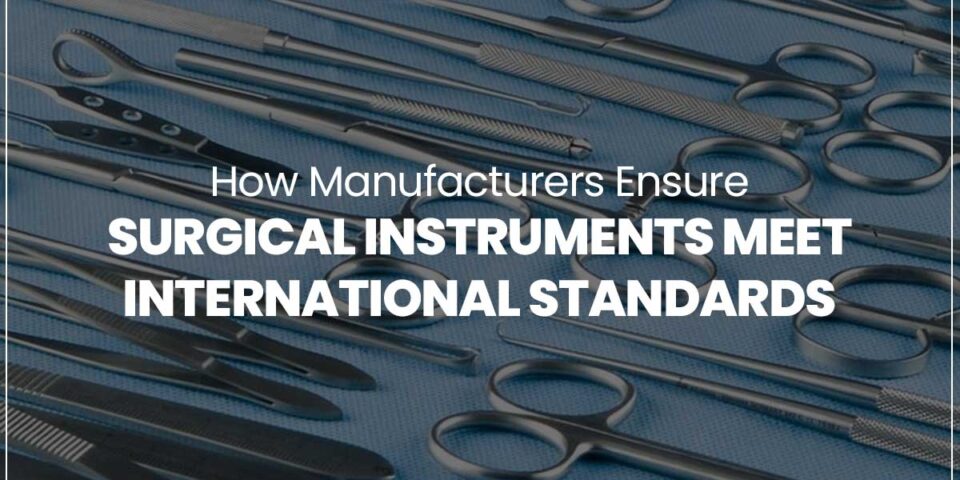In the health sector, precision and quality in surgical instruments are not preferences but imperatives. Surgical tools are part of patient care, and every instrument must meet stringent international standards. Meeting these standards ensures the safety of patients and the efficacy of procedures, which is why surgical instruments manufacturers in Chennai employ various measures to ensure their products are top-notch.
1. Stringent Material Selection And Quality Control
The quality and performance of surgical instruments are heavily reliant on material choice. We use medical-grade stainless steel, titanium, or other very wear-resistant metals against corrosion and frequent sterilization. Materials are tested under extreme conditions for endurance, strength, and chemical resistance to ensure that every instrument performs under demanding conditions. Each lot undergoes quality control tests to test the compliance of its product according to global standards like ISO 7153-1, which prescribes requirements for corrosion-resistant surgical instruments.
2. Compliance To Global Standards And Registrations
For having universal acceptance and credibility all over the world, most manufacturers seek accreditation like ISO 13485 for medical devices and CE marking for selling the product within the European Economic Area. Adhering to standards regarding quality management systems in design, production, and inspection at completion, these qualifications ensure that the finished instruments meet agreed-upon criteria. Guidelines for the manufacturing process are represented by ASTM F899-the standard for surgical instrument requirements-and ISO 17664-which outlines reprocessing. Satisfaction of these exacting standards instills confidence in hospitals and other healthcare organizations regarding the safety, sterility, and practical function of such instruments.
3. Stringent Processes And Precise Manufacturing Engineering
Advanced manufacturing techniques include Computer Numerical Control machining, laser cutting, and electro-polishing. CNC machining allows the production of instruments with accuracy because it gives the manufacturer the ability to attain accurate tolerances. Electro-polishing increases corrosion resistance, resulting in a smooth and non-porous surface that would aid in sterilization. Manufacturers often use automated systems when error due to human hands could undermine the consistency of large batches.
4. Sterility And Durability Testing
Each instrument is tested for sterility and durability before being placed within a clinical setting. In addition to autoclave tests where instruments are subjected to high temperature, high pressure steam, the most comprehensive life-cycle testing can simulate multiple applications and sterilization cycles in a hospital. Some tests extend instruments far beyond normal conditions such that the durability of the instrument can be better assessed for identifying potential failure points before the product ever leaves the door.
5. Inspection And Final Quality Control
Once any flaw or blemish in an instrument is identified, it is subjected to a final inspection before it is shipped. Utilizing high-precision equipment like microscopes and measuring devices, the manufacturers and surgical instruments suppliers inspect its product for conformity to the requirements. Quality control inspectors scrutinize each instrument’s sharpness, alignment, and overall performance with much accuracy. Some manufacturers even make use of a barcode tracking system that will allow end-users to track down where each instrument originated. This will help hospitals be very responsible and manage their stock properly.
6. Continuous Improvement And Innovation
Because the nature of technology is constantly changing, manufacturers continually come up with innovative improvements in the designs and functionality of the surgical instruments. Feedback is taken from health professionals, with specific recommendations given on improving usability, ergonomics, and sterilization protocols. The adoption of state-of-the-art technology would mean making instruments that are even beyond international standards and give healthcare providers more than adequate tools for improved safety and successful procedures in every single surgery.
International standards to be met demand that surgeons have tight material selection control, strict manufacturing protocols, and high quality controls in putting together surgical instruments. A combination of rigorous testing, continuous innovation, and the product’s guarantee of patient safety and successful outcomes all increase confidence within the medical field. The next time a surgeon grasps the scalpel, it will represent the culmination of many trials, done with only one goal in mind: excellence in healthcare delivery. At R.L.Hansraj we have an online surgical store which caters to the needs of all healthcare professionals and hospitals.

